Key takeaways:
- The anti-death penalty movement is deeply rooted in a belief in the sanctity of life and advocates for justice reform to address systemic inequalities.
- Support systems are essential for resilience, enhancing advocates’ voices and helping them navigate emotional challenges and public backlash.
- Sharing personal experiences fosters collective strength and empathy, encouraging others to engage in activism and advocacy.
- Strategies like setting achievable goals, practicing gratitude, and immersing in inspiring content are vital for sustaining motivation in advocacy efforts.

Understanding the anti-death penalty movement
The anti-death penalty movement is rooted in a profound belief in the sanctity of life. I’ve often wondered, what does it say about our humanity if we condone the state taking a life? My journey in the movement has shown me that for many, this question is not just philosophical; it feels deeply personal, shaped by stories of wrongful convictions and the irreparable damage they cause.
Throughout my involvement, I’ve witnessed the range of emotions that fuel this movement—anger, sorrow, but also hope. There’s something incredibly powerful about hearing the stories of families affected by wrongful executions. Each narrative is a stark reminder of the fallibility of our justice system, prompting me to reflect on the human costs beyond statistics. Have you ever considered how easily someone’s life can be upended by a mistake?
Moreover, the movement is not solely about opposing capital punishment; it’s about advocating for justice reform that addresses systemic inequalities. I remember a particularly moving event where a panel discussion highlighted personal experiences of those who had lost loved ones to the system, revealing how their grief transformed into activism. It made me realize that understanding the anti-death penalty movement extends beyond mere opposition—it’s about fostering conversations that drive change and understanding.
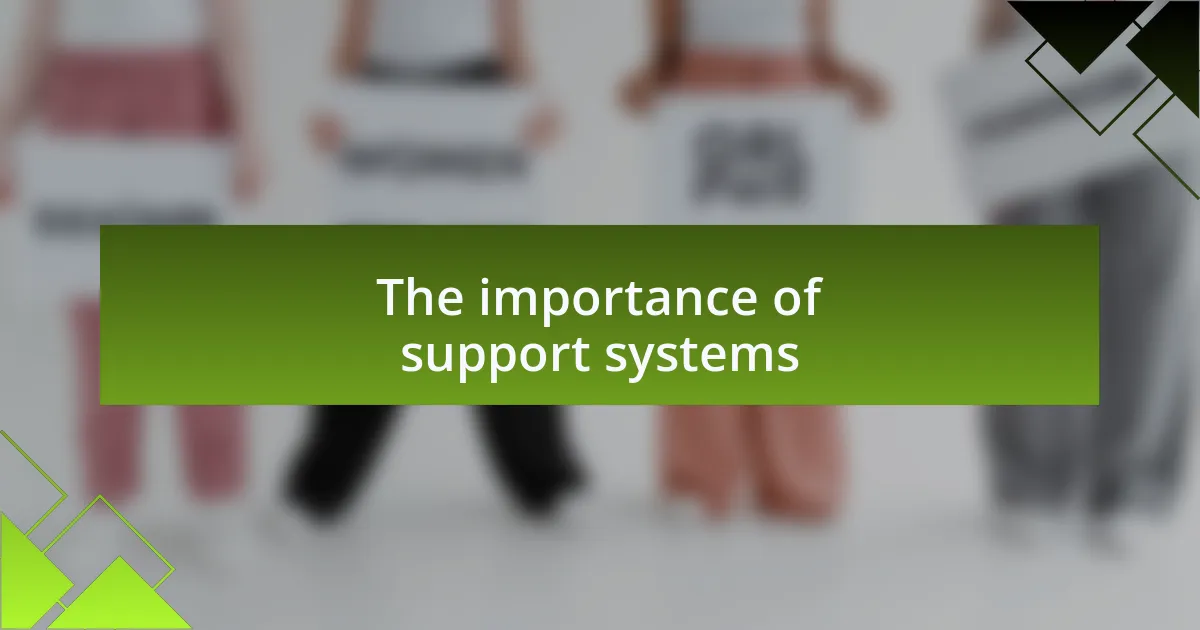
The importance of support systems
Support systems play a crucial role in navigating the challenges associated with advocating against the death penalty. I vividly remember a time when I felt overwhelmed by the weight of the narratives I absorbed. It was during that phase that a close friend reached out, reminding me of the importance of having others to lean on. Without that support, I might have become disheartened, but sharing my thoughts and feelings with someone who understood revitalized my commitment to the cause.
I’ve also seen how groups of like-minded advocates form an informal network of strength. When I attended a gathering of activists, the atmosphere was electric with shared experiences and collective determination. Listening to others recount their struggles not only validated my feelings but challenged us all to keep pushing for change. Have you ever found strength in a community that resonated with your beliefs? That camaraderie reaffirms our shared mission, making the arduous journey feel much less isolating.
Ultimately, having a support system fosters resilience and enhances our voices against injustice. When I faced personal setbacks in my activism, the encouragement from my peers helped restore my focus and belief in our shared goal. I often think about how critical companionship is in sustaining hope; it’s a reminder that I’m not alone in this fight. Wouldn’t it be comforting to know that no matter how daunting the struggle, you have allies by your side?
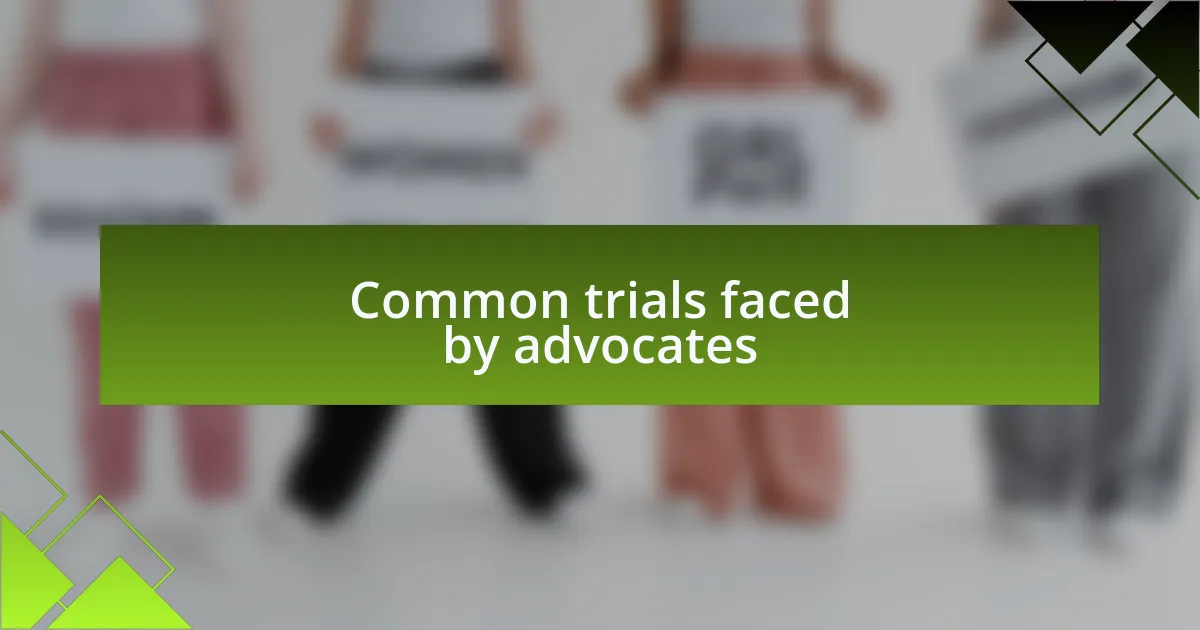
Common trials faced by advocates
Advocates often grapple with the emotional toll of the injustices they confront. I recall one particularly harrowing day when I read about a wrongful execution. The raw sense of anger and sadness was almost unbearable. It was hard not to internalize that pain—it made me question my own efforts. Have you ever felt that heavy weight? It took me time to understand that this intensity, while difficult, is part of a broader struggle to ignite change. Knowing others felt similarly helped me process those moments.
Another common trial is dealing with public backlash. Engaging in such a controversial issue often means facing criticism, which can be disheartening. I remember sharing my views on social media, only to be met with a barrage of negative comments. Initially, it hurt, and I questioned my motives. Yet, this experience taught me the importance of resilience and the need to occasionally step away to recharge. Have you ever had to ignore the noise to stay true to your beliefs? Standing firm in my commitment became a source of empowerment, reinforcing my understanding that dissent is often a precursor to meaningful change.
Lastly, time can be a significant barrier. Advocacy is a long game, requiring persistent effort and dedication. Balancing activism with personal responsibilities, such as work and family, can feel overwhelming. I’ve had days when I had to choose between attending a critical meeting or helping my child with homework. It’s a struggle many face: how do we allocate our limited time to the causes we care about? Finding effective time management strategies and setting realistic goals has been essential for me. Have you found ways to navigate this balancing act? Embracing those small victories along the way can make the journey more sustainable and rewarding.
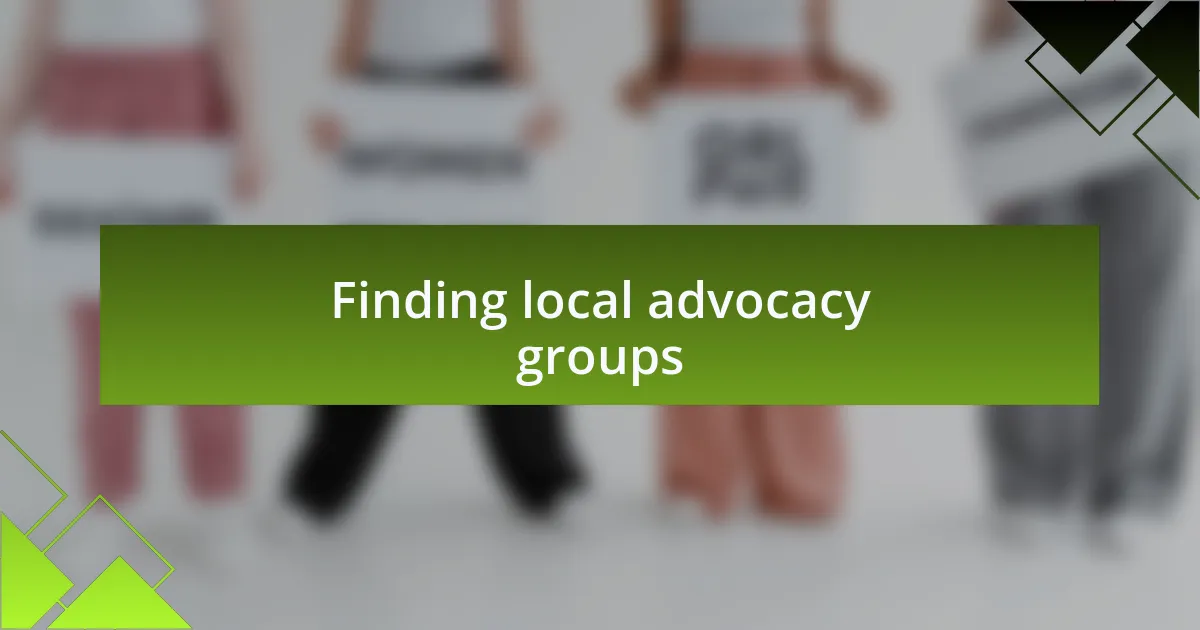
Finding local advocacy groups
When I set out to find local advocacy groups, I was surprised at how much support was available in my community. I remember attending a small meeting at a local library and feeling an overwhelming sense of belonging. It was a reminder that, sometimes, just turning up is the first step to connecting with people who are equally passionate about the cause. Have you ever walked into a room filled with strangers who share your passion? That feeling of solidarity can be powerful.
Social media platforms proved invaluable in my search. By joining Facebook groups focused on anti-death penalty movements, I quickly uncovered multiple local organizations I had never heard of. Each post was a window into the collective efforts, events, and discussions happening right next to me. I found it empowering to connect with individuals who not only shared my concerns but also offered concrete ways to take action. Have you utilized social media in your search for support? It can really broaden your horizons.
Another resource I found effective was local universities. Many academic institutions host events and lectures featuring experts in the field of criminal justice reform. Attending these events opened up opportunities to meet advocates and learn of grassroots initiatives. I left one lecture inspired and immediately reached out to others I met there. How often do we overlook the connections we could create in our own backyards? Engaging with local academia can unlock a wealth of support and fresh perspectives on our advocacy journey.
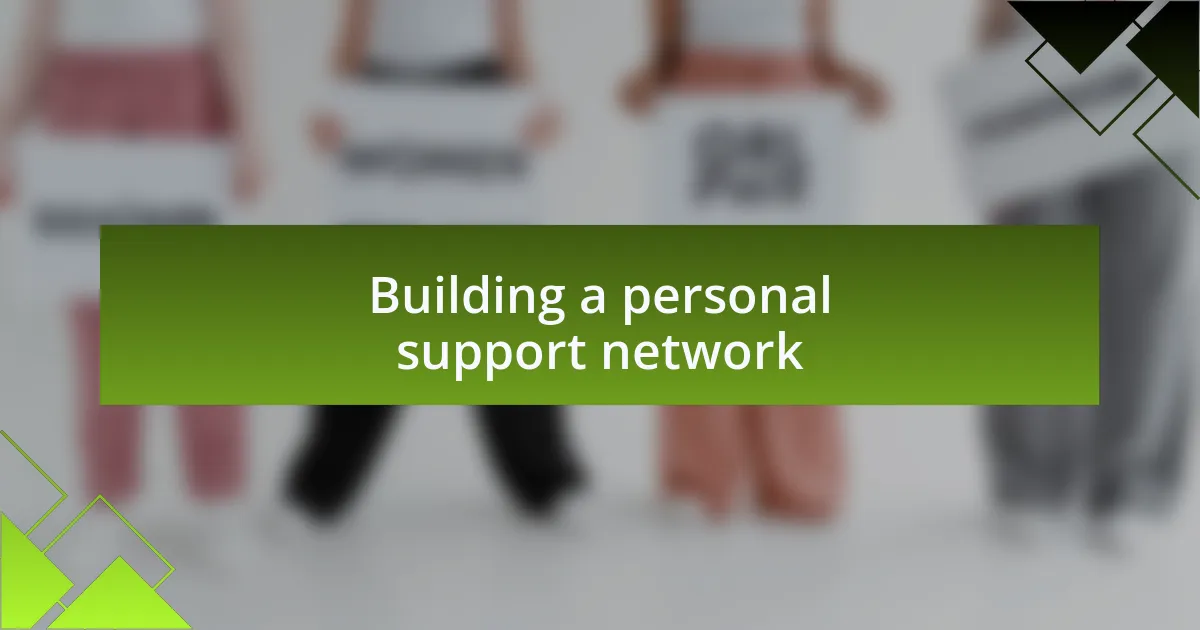
Building a personal support network
Building a personal support network sometimes feels daunting, but I found that starting with familiar faces made all the difference. I reached out to friends and family, sharing my passion for anti-death penalty advocacy. To my surprise, several of them expressed interest in joining the cause, making me realize that support can come from unexpected places. Have you tried talking to those closest to you about your passions? You might find allies in your own circle.
As I dedicated more time to this cause, I discovered that attending local meetups enabled me to forge deep connections. I recall sitting next to someone at a rally who struck up a conversation about our shared frustrations. We exchanged stories and ideas, which not only validated my feelings but also led to us collaborating on community initiatives. It’s incredible how such spontaneous interactions can blossom into significant friendships. Have you ever experienced a meaningful encounter at an event that changed your perspective?
Lastly, I learned the importance of diversifying my network to include voices from different backgrounds. By connecting with individuals who had personal experiences with the justice system, I was exposed to a range of insights that enriched my understanding of the issues. I recall hosting a small gathering at my home where we shared our stories over coffee. It became a powerful forum for dialogue and support, reminding me that unity in diversity strengthens any movement. Are you open to seeking out different perspectives in your advocacy journey? The richness of shared experiences can truly enhance our resolve.
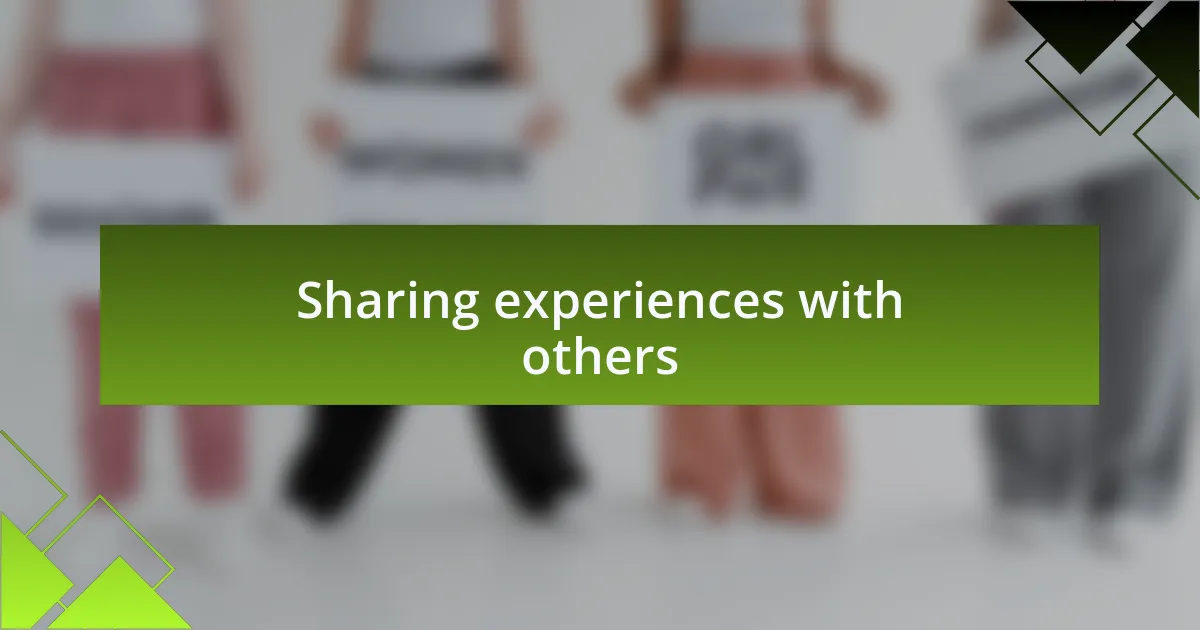
Sharing experiences with others
Sharing experiences with others has a way of transforming individual trials into collective strength. I remember one particular evening when I joined a support group for anti-death penalty advocates. As each member shared their story, I felt an overwhelming sense of belonging. Have you ever been in a room where you felt completely understood? That night, I learned that voicing my struggles not only lightened my burden but also inspired others to speak out, creating a tapestry of shared resilience.
In another instance, I decided to document my journey through a blog. Initially, it felt like just another project, but the comments I received opened my eyes to a community I didn’t know existed. Readers shared their own battles and triumphs, and it became a safe space for dialogue. It clicked for me that our collective stories could spark activism, encouraging more people to join the conversation. Have you considered using your words to connect with others? Sometimes, sharing your experience can mobilize an entire movement.
The power of storytelling lies in its ability to foster empathy and understanding. I recall attending a forum where someone shared their experience of losing a loved one due to a wrongful conviction. The raw emotion in their voice resonated deeply within me, igniting a passion to advocate for change. How often do we overlook the impact of heartfelt narratives? Each time we share our experiences, we not only heal ourselves but also light a path for others to follow, creating a supportive network that becomes the backbone of advocacy.
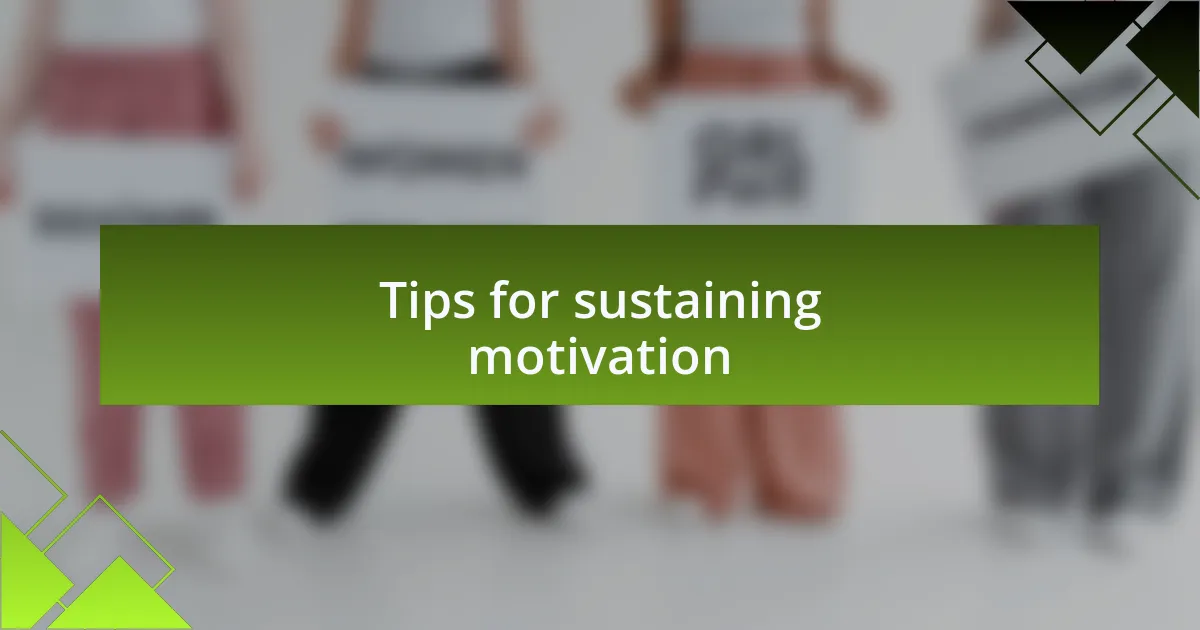
Tips for sustaining motivation
Finding ways to sustain motivation during difficult times is crucial. I recall a particularly challenging phase when the weight of the world felt unbearable. During that time, I created a list of achievable daily goals—simple tasks like reading an article about anti-death penalty efforts or reaching out to a friend for a quick chat. These small accomplishments acted like stepping stones, fueling my drive and reminding me that every little action contributes to a larger purpose.
Another strategy I embraced was the practice of gratitude. I started keeping a journal where I noted down moments of hope, no matter how small they seemed. On days when discouragement crept in, flipping through those entries became a balm for my spirit. It made me question: How often do we pause to reflect on the positives amid adversity? Maintaining a perspective of gratitude shifted my focus, allowing me to draw strength from the hope and support around me.
Immersing myself in inspiring content also played a significant role in keeping my motivation alive. Podcasts and interviews with activists who have faced similar trials became my sanctuary. Their stories resonated with my journey and propelled me forward. Don’t underestimate the power of surrounding yourself with voices that energize you—those narratives can be a lifeline when motivation wanes. What resonates more than hearing someone say, “I’ve been there, and I conquered it”? It not only lifts my spirits but also strengthens my resolve to fight for justice.